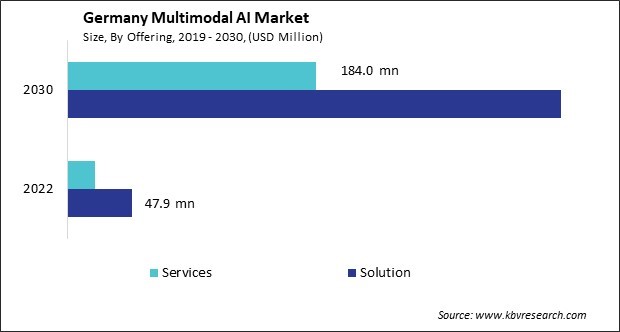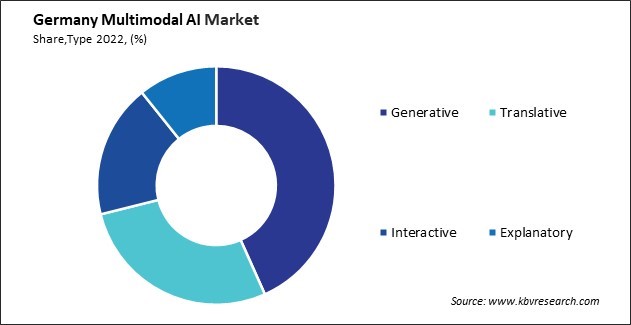Int'l : +1(646) 832-2886 | query@kbvresearch.com
Int'l : +1(646) 832-2886 | query@kbvresearch.com
Published Date : 16-Feb-2024 |
Pages: 93 |
Formats: PDF |
The Germany Multimodal Al Market size is expected to reach $549.1 million by 2030, rising at a market growth of 30.3% CAGR during the forecast period.
Germany, known for its strong industrial base and technological innovation, has been actively involved in advancing AI technologies. Germany, known for its manufacturing prowess, is integrating AI into its industrial sector. AI-powered automation, predictive maintenance, and quality control are enhancing efficiency and productivity, a part of the broader Industry 4.0 initiatives. There's a thriving ecosystem of AI startups in Germany. Cities like Berlin, Munich, and Frankfurt host numerous startups focusing on various AI applications, from healthcare to finance and robotics.

German corporations, especially in the automotive, finance, and healthcare sectors, have been adopting AI for various applications. Companies like BMW, Siemens, and Deutsche Bank are investing in AI to improve operational processes, customer experiences, and product development. Moreover, the nation, along with the European Union, emphasizes ethical AI development and deployment. There are regulatory frameworks in place, such as GDPR, ensuring data protection and ethical use of AI.
Germany has been actively developing strategies to position itself globally as a leader in AI. The "AI Made in Germany" initiative aims to promote AI innovation, research, and adoption across various industries. It focuses on strengthening Germany's position in the global AI sector and fostering collaboration between industry, academia, and government.
The nation has allocated a budget of €3 billion until 2025 to maintain Germany's competitiveness in the future by making Europe a leading center in the field of AI. Germany attaches great importance to the economic growth that AI will bring, and in this context, steps are taken toward sectoral awareness and workforce transformation. The nation has declared that it wants to be a "seal of quality" in the development of AI technologies and aims to be a center of excellence in line with its industrial capacity.
Germany's expanding manufacturing sector has increased the utilization of multimodal AI technologies across various facets of production, management, and optimization. The nation's emphasis on Industry 4.0, which involves the digital transformation of manufacturing, has prompted the integration of multimodal AI technologies. Germany is renowned for its machinery and automotive industries. Companies like Siemens, Bosch, Volkswagen, and BMW are global leaders, contributing significantly to the country's economy and exports.
The nation specializes in producing high-value, high-quality goods, including precision machinery, automotive components, chemicals, and industrial equipment, catering to niche markets worldwide. AI and digital technologies are increasingly being integrated into manufacturing processes to optimize production, improve quality control, enable predictive maintenance, and enhance overall efficiency. As Germany aims to maintain its position as a global manufacturing leader, there's a continuous drive for innovation and technological advancement. Multimodal AI technologies are seen as a means to drive innovation, increase competitiveness, and meet evolving market demands.
The automotive sector in Germany is experiencing a significant transformation with the increasing prospects for the use of multimodal AI. At the forefront of this transformation is the development of autonomous vehicles, where multimodal AI plays a pivotal role. By amalgamating data from sensors, cameras, GPS, and other sources, these AI systems enable vehicles to perceive and navigate their surroundings, pushing the boundaries of safety and innovation on the roads. AI-driven multimodal systems contribute to improving energy efficiency in vehicles, optimizing fuel consumption, reducing emissions, and supporting sustainability initiatives.
Moreover, predictive maintenance, facilitated by multimodal AI, is transforming vehicle reliability. These systems analyze diverse sensor data to forecast and prevent potential failures, reducing downtime and ensuring vehicles operate at peak performance. This proactive maintenance approach aligns with Germany's penchant for precision engineering and reliability in automotive manufacturing.
Germany boasts the largest automotive industry in Europe, ranking first in production and sales. It is accountable for nearly 20 percent of all new registrations and approximately 25 percent of all passenger cars manufactured. Additionally, Germany contains the greatest number of OEM plants in Europe. As of the 2022/2023 issue of The Automotive Industry in Germany report published by the Germany Trade & Invest, there are 44 OEM sites in Germany. German OEM market share in the EU was more than 55 percent in 2021. The burgeoning automotive sector in Germany is propelling a profound demand for multimodal AI. With the expansion of the automotive industry, the incorporation of multimodal AI is positioned to significantly influence the trajectory of automotive innovation and propel unprecedented progress in the domain.

Germany hosts a vibrant ecosystem of companies at the forefront of multimodal AI development, contributing significantly to advancements in artificial intelligence. Among these companies, several stand out for their expertise in integrating multiple data modalities for innovative AI solutions.
One such company is Merantix, based in Berlin, known for its applied AI solutions spanning computer vision, natural language processing, and multimodal AI applications. Merantix collaborates across industries, leveraging AI technologies to solve complex problems as well as drive innovation in diverse sectors. They collaborate with businesses to develop AI solutions for different industries.
Twenty Billion Neurons (TwentyBN) specializes in human behavior understanding through AI-powered computer vision. With a focus on interpreting human actions and behaviors from video data, TwentyBN's multimodal AI models aim to enhance interactions between humans and machines.
In conversation intelligence, i2x stands out for its AI-driven solutions. Their expertise lies in speech analytics and natural language processing, utilizing multimodal AI to improve customer interactions and glean insights from conversational data.
Acellere is another notable company integrating AI technologies into software development tools. While focusing on software intelligence and code analysis, they explore AI's potential for multimodal data analysis in understanding and improving software ecosystems.
Additionally, i2solutions focuses on AI-powered image and video analytics, specializing in surveillance, retail, and automotive industries. Their focus on leveraging AI for processing and understanding visual data contributes to the development of innovative solutions in these domains.
By Offering
By Type
By Technology
By Data Modality
By Vertical